Lecture | CMGI Brown Bag Seminar
Gradients of Europeanness in Colonial Africa: the case of the Portuguese in the Congo Free State (c.1885-1908)
- Date
- Wednesday 1 June 2022
- Time
- Address
-
Johan Huizinga
Doelensteeg 16
2311 VL Leiden - Room
- Conference room (2.60)
After the Berlin West Africa Conference in 1884-1885 recognised the International Association of the Congo’s sovereignty over the Congo Basin, Leopold II, king of the Belgians, became the head of the new Congo Free State. In accordance with the principles of the General Act of the Berlin Conference, the Congo Free State granted free and unfettered access to any individual, trading company or religious mission that wished to settle in the colony, regardless of their national origin. Against the backdrop of increasing imperial rivalries that marked the Scramble for Africa, the Congo Free State remained a lively cosmopolitan hub, attracting a new influx of migrants from Europe. But Africans at the Congo Basin had witnessed the arrival of Europeans of different origins who established permanent trading posts in coastal areas since the sixteenth century, giving rise to colonial societies where forms of identification as European were not in black and white. Ideas of Europeanness were understood as on a spectrum with many gradients. To explore how they were affected by late-nineteenth-century transformations, GRADIENTS take the case of the Portuguese in the Congo Free State as a point of departure.
